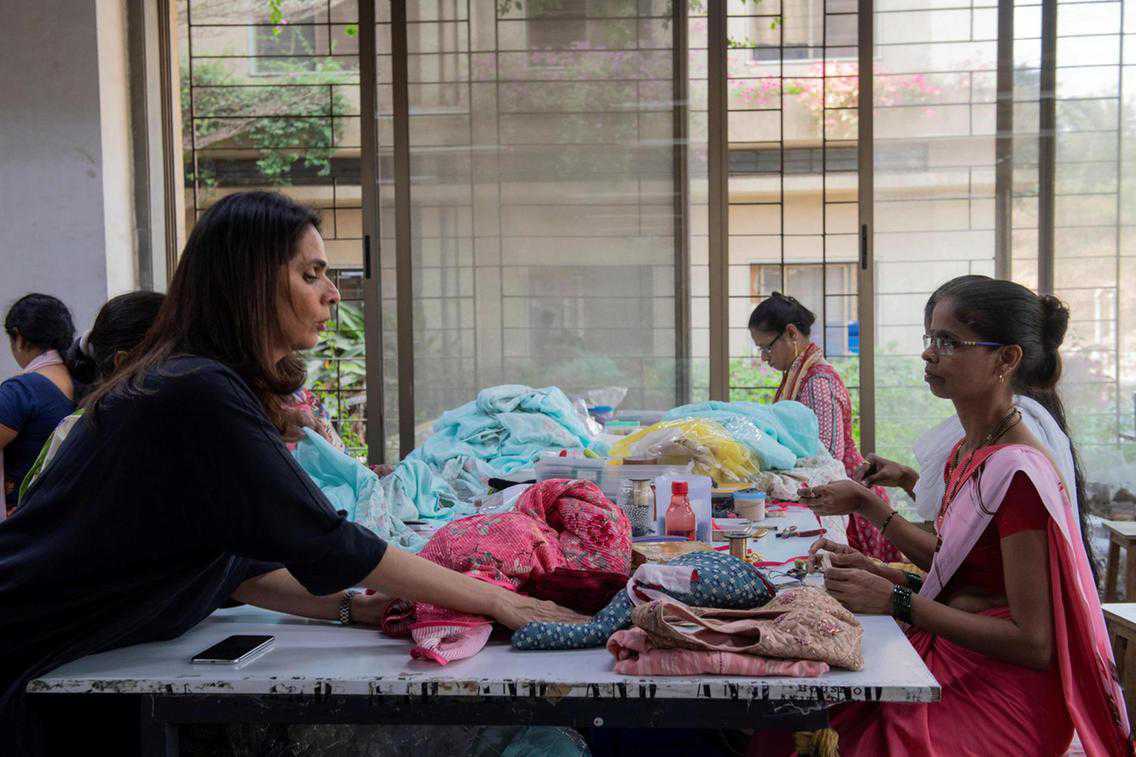Indian designer Anita Dongre wants to put the earth before profit
02 March, 2020

With stores in India and New York, multiple clothing brands and a worldwide celebrity following, fashion designer Anita Dongre is a feminist powerhouse in a male-dominated industry. But her true ambition is to create an environmentally sustainable company, she says.
"Sometimes I wish I possibly could just quit design and focus on sustainability full-time," says Dongre. "Time is running out. Climate change is right at our doorstep and most of us want to do something," says the designer, 56, whose clothes have already been worn by a number of the world's most high-profile women including Hillary Clinton, Kate Middleton, Ivanka Trump, Priyanka Chopra Jonas, and Beyonce.
Transforming a company with an twelve-monthly turnover of $105 million (Dh385m) right into a carbon-neutral enterprise is a daunting proposition, but Dongre hasn't been someone to shy away from a challenge. When she started her business at age 23, armed with two sewing machines and two male tailors perched on the balcony of the bed room she shared with her sisters, she was the first woman in her conservative family to work.
Feminist ideals
She says that of most her accomplishments, she actually is proudest of her commitment that no woman seeking work will ever be turned from the gates of the four-storey factory she now works on the outskirts of her home city of Mumbai.
"I see my journey reflected in theirs," she says, emphasising her belief that "economic empowerment is the only way a woman can assert herself".
Besides making five clothing lines, handcrafted fine jewellery and accessories, her foundation provides training and jobs to a lot more than 250 rural women, with plans to cover 30 villages by 2025.
Feminist values have been in the centre of Dongre's brand: for example, her clothing is definitely size-inclusive, going up to an XXL.
Even though she ventured into bridal wear, her promotional initiatives challenged traditional norms and featured women sporting tattoos and spending money on their weddings (still a rarity in India where, traditionally, the daddy of the bride footed the bill).
"It is vital for me showing a woman who's not coy or veiled - someone bold and sassy. I was that girl. I drove a jeep. I proposed to my hubby," she says. "The world hasn't been fair to women... and I am uncomfortable promoting regressive suggestions to sell clothes."
Her decision to give attention to the urban professional woman has seen the brand reap dividends as female spending power increases in India. "It's so rewarding to walk into stores and meet up with the women who buy my clothes. When a customer tells me: 'I wore your blazer to my first appointment 15 years ago and I acquired the job', it's thrilling," she says.
Eco-friendly efforts
She will have to count on that goodwill to convince customers to shop in a wholly different way than they are being used to: prioritising sustainability and slow fashion over instant gratification.
On the one hand, Dongre's task hasn't been easier - when she spoke about green design greater than a decade ago, few paid attention. Today, she says, "I am glad it's finally fashionable to be green."
However, she acknowledges that greenwashing is a huge risk. "You can't take a sustainable fabric, cover it with plastic sequins but still call it sustainable."
Dongre is the only Indian designer to become listed on the Sustainable Apparel Coalition, a worldwide alliance of retailers, brands, suppliers, campaigners and labour groups that delivers members with tools to measure the environmental impact of their activities. The SAC is a non-binding organisation, meaning members are largely in charge of their own efforts towards sustainability and transparency.
For her part, Dongre says she feels a drive "to accomplish more and more" on environmentally friendly front. At her factory, cafeteria food waste is composted or used to make biogas, while the water utilised in clothing production is recycled and pumped back to the bathrooms.
Her lower-priced brands And and Global Desi use fabrics such as for example sustainably produced tencel - a biodegradable fibre manufactured from wood pulp - as the slow fashion luxury label Grassroot showcases hand-woven, hand-embroidered designs created by Indian artisans.
Beyond profit
"The largest challenge is educating the buyer to aid our efforts," she says. Moreover, it is hard to imagine what sort of company that employs 2,700 people and works with thousands of artisans could be environmentally responsible without compromising on profits.
It really is, Dongre says, a price she is ready to pay. "Companies cannot be driven only by profits... this idea of making profit whatever way possible and then giving large sums to charity, it isn't sustainable. You will want to make contribution to your community a focus of your business to get started with?
"It's about time companies measured their success regarding sustainability, not simply profit and loss," she says.
Source: www.thenational.ae
